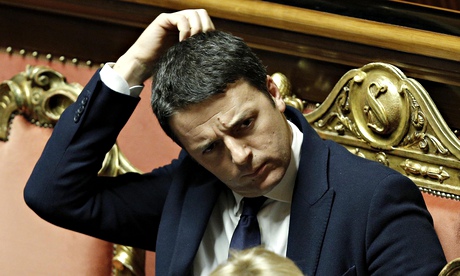
When Italian prime minister Matteo Renzi confirmed last week that Rome would enter a bid to host the 2024 summer Olympic Games, it was a moment that divided the nation. How could the country afford the £10bn, or even £20bn-plus bill to stage the Olympics when the Italian economy has failed to grow in every quarter since 2011 and the national income is the same as it was in 1997?
Renzi dismissed his critics, saying: “Our country too often seems hesitant. It’s unacceptable not to try... or to renounce playing the game.”
What he meant was that Italy is a premiership team and should therefore be prepared to compete with the best. Yet while the social democrats think big, Italy’s rightwing parties are declaring the whole thing unaffordable. Not just the Olympics, but the foreign wars, what’s left of the foreign aid budget and, most pressingly, the euro.
Silvio Berlusconi’s Forza Italia, Beppe Grillo’s Five Star Movement and the Northern League all agree that Italy cannot hope to compete with northern European rivals inside the same currency zone. Between them they represent almost 45% of the Italian electorate, rising to almost 50% once Eurosceptic parties are included.
These three parties hate each other almost as much as they loathe Renzi’s Democrats. But, still, this discontent with the euro, and the almost intuitive understanding of the single currency’s ability to set Italian workers against German and Austrian rivals with only one obvious loser – Rome – illustrates how the euro project is crumbling.
Only a couple of years ago, Italy would have stood aside from all the hand-wringing about the euro. Middle-income Italians were solidly in favour of a project of which they saw themselves as founding members. And more importantly, their vast savings and property values were in euros. Any attempt to withdraw would almost certainly entail a devaluation of 50% or more and the destruction of 50 years of scrimping.
Roberto D’Alimonte, professor of politics at Rome’s Luiss university, says growing discontent with the euro is still an emotional response to domestic austerity cuts and could not be translated into an outright vote against the euro. He says a referendum calling for a withdrawal would be lost. So for the time being, a splintered rightwing opposition and an incoherent response to the euro allow Renzi to forge ahead.
But D’Alimonte warns that the resurgence of the Northern League is a sign of growing discontent. An opinion poll earlier this month gave the 41-year-old party leader, Matteo Salvini, a personal popularity of 26% and his party 10%.
D’Alimonte says these polls underestimate the powerful surge enjoyed over recent months by the Northern League, which has also reached out to discontented southerners.
Salvini calls the euro a “criminal currency” and wants to demolish a Brussels consensus he says is strangling European politics. The successor to party founder Umberto Bossi, who was brought down by a financial scandal, Salvini is also an admirer of Vladimir Putin and friend of French National Front leader Marine Le Pen.
To the shock of many on the left, he has overtaken Grillo as the cheerleader for an Italy that accepts demotion to the second division. “The Europe of today cannot be reformed, in my opinion,” he told the Foreign Press Association in Rome. “There’s nothing to be reformed in Brussels. It’s run by a group of people who hate the Italian people and economy in particular.”
When asked whether he worried about spooking the financial markets with his radical plans to withdraw from the euro, impose a single flat tax rate of 15% and deport illegal immigrants, he said: “I don’t want to reassure anyone at all.”
Giuseppe Ragusa, an economics expert also at Luiss university, says Renzi has until the end of next year to pull the economy round before an impatient Italian public turns on him. Like D’Alimonte, he says few would vote to pull out now, but another year of stagnation could persuade them.
Among Renzi’s supporters, Pier Carlo Padoan is the financial driving force. As the new finance minister, extracted from his comfortable seat as chief economist at the OECD in Paris, Padoan is doing his best to rejuvenate the economy. But like so many of Europe’s finance ministers, he has little money with which to do it.
Instead he must plead with Brussels, which he did last week on the eve of a national strike and after news that the country’s industrial production fell yet again in October. He said: “There isn’t much time. Europe is at a fork in the road. One path leads to stagnation; the other to growth that we sorely need.”
Inside his ministry, some believe a reform agenda promoted by Renzi that will overhaul the civil courts, allow companies to shed workers and offer limited tax cuts can spur growth. But much of the detail is bogged down in fractious parliamentary committees and, as Padoan says, without cash from Brussels or a relaxation of fiscal rules to allow greater investment, the project will slow from a sprint to a marathon.
And while it is laudable of successive social democrat leaders to try to run with the Germans inside the euro, it must be an increasingly forlorn hope that Europe’s ageing societies, of which Italy is among the most elderly, can rejuvenate their fortunes in the next few years inside a currency straitjacket.

